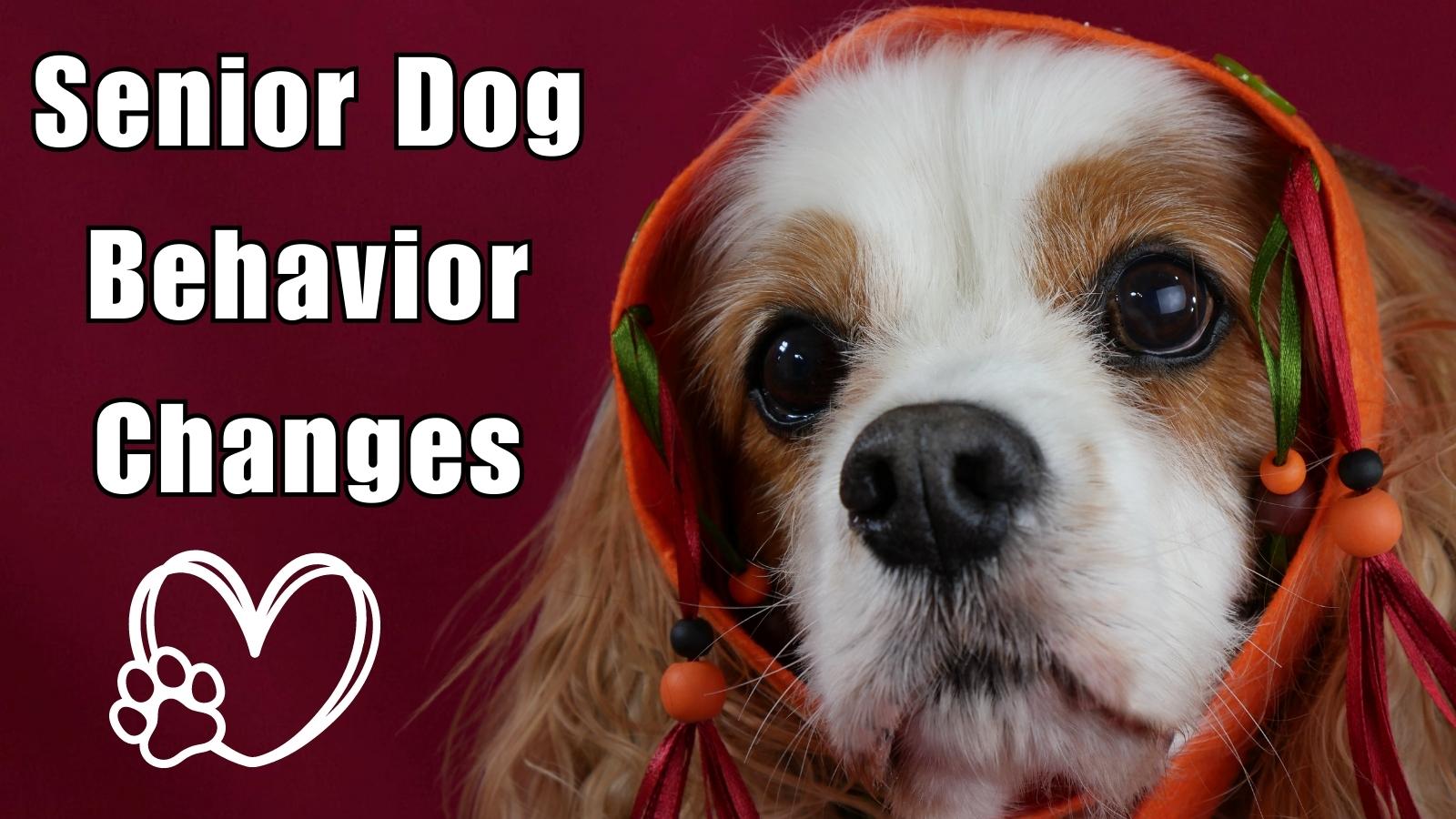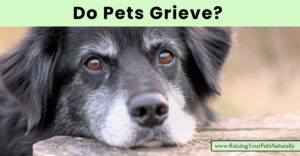Google Adsense—>

Older Dog Suddenly Becoming Anxious

Honestly, I never thought senior dog anxiety would be part of Dexter’s life. For those new to our blog, Dexter is my 13.5-years-young Cavalier King Charles Spaniel. I raised him to be a very secure, happy, stress-free dog, who has shown no anxiety until recently. And when I say, “no anxiety,” I’m not kidding. Unless you consider his love-hate relationship with feathers, he never bats an eye at the loudest noises, dogs barking at him, strangers making any kind of racket, or separation anxiety.
Dexter has had a bit of a life-change. You see, we are an adult household of three, and two adults retired three years ago. This means, more family time, and less alone time. Don’t get me wrong, I still make it a point to ensure he has some alone time, but he has had a lot of Grammy and Eddie time when I’m not home.
The other change is two episodes of canine vestibular disease, or old dog disease as it’s also referred to. His episodes happened at night. Knock on wood, his attacks were temporary, but I am prepared should they happen again.
Anxiety in Older Dogs: Dexter’s Symptoms
I’ve been noticing Dexter becoming a bit more clingy and, sometimes, he can be a bit whiny. When he seems fussy, I check on him to make sure his needs are being met, that he can get up, isn’t in pain, and isn’t asking me for something.
Dexter is also exhibiting mild signs of senior dog separation anxiety. Before, when I left, he would happily trot into his crate for a siesta. Now, it’s a bit of a hit or miss. Sometimes, he goes right in, other times he stands outside his crate and I need to coax him, and even then he doesn’t settle as before. Sometimes he even barks or cries. Now, if I’m already at work, and Grammy puts him in, it’s not an issue at all.
Dexter’s Medical and Environmental History
Dexter also has been going to canine rehabilitation, basically on and off, throughout his life, for his Chiari malformation. We’ve bumped this up to almost weekly sessions and added in more regular acupuncture treatments.
Canine enrichment is always part of his life. We play games, go for sniffy walks, take strolls, go to parks, indoor stores, and use food toys. Plus, we practice his canine fitness exercises and tricks at home at least four times a week.
Dexter is on a fresh DIY raw diet and gets healthy and supportive supplements. I don’t use chemical products on Dexter, and he lives a pretty natural lifestyle, with the exception of some necessary pharmaceuticals due to his CM & MVD. He sees his veterinarian four times a year for a full physical exam, CBC panel, thyroid test, and urinalysis.
So, what’s going on with Dexter? I thought this would be a good time to reach out to some pet professionals to see why senior dogs develop anxiety, symptoms to look for, and senior dog anxiety treatment options.
What Causes Senior Dog Anxiety?
Theresa Fossum DVM, MS, Ph.D. Diplomate ACVS, and author of Small Animal Surgery said, “With both AD and CCD, neurotoxic proteins accumulate in the brain, and these plaques, along with cerebrovascular disease (compromised brain vasculature), contribute to the brain impairment that is a hallmark of these disorders.”
She continued by stating, “ Although dogs with CCD are typically recognized as showing cognitive impairment by 8 years or older, there is considerable evidence that the processes leading to this clinical state begin earlier in life. Furthermore, dogs become geriatric at different ages depending on their breed. Large and giant breed dogs tend to become ‘old’ at an earlier age than do small breed dogs. Large and giant breeds dogs are often mentally old at 5 or 6 years of age, while medium breeds are mentally old at 8-9 years, and toy breeds may not show evidence of CCD until they are 10 years of age or older.”
Alex Schechter, DVM, founder of Burrwood Veterinary, said that, “Every dog is unique, and anxiety can be spurred on by several factors, including changes in the dog’s environment, health problems, or previous experiences.”
I was curious as to whether a senior dog may become anxious as he ages due to his declining senses, including neurological decline. Dr. Schechter suggested, “The deterioration of aged dogs’ cognitive capacities is one possible factor in their anxiety. For instance, dogs may exhibit cognitive decline similar to people with illnesses like dementia or Alzheimer’s, resulting in bewilderment, disorientation, and anxiety.
He went on to say, “Additionally, as they age, dogs may endure sensory changes that might make them worried or uneasy, such as deteriorating vision or hearing. This may be particularly true if the dog is anxious and depends on their senses to feel secure in their surroundings. Navigating the world and acclimating to new environments might be more difficult as they age. As a result, they could experience anxiety and agitation in strange environments.”
Dr. Schechter went on to say, “Also there are instances where the older dogs may exhibit more anxiety because their brains are experiencing stress due to declining sensory abilities combined with other factors such as arthritis and osteoporosis, which make it difficult for them to physically move about easily in their surroundings without falling somewhere along the way.”
Environmental changes also can increase a dog’s anxiety. Dr. Schechter stated, “Changes in their living situation, such as moving to a new house or altering their routine or daily activities are additional variables that could be causing anxiety in older dogs.”
Anxiety in Older Dogs: Symptoms
Dr. Fossum explained, “Fortunately, dogs with cognitive decline or dysfunction seldom show the severity of cognitive dysfunction seen in humans with Alzheimer’s disease; however, even mild or moderate changes can make living with affected pets difficult. In addition to nighttime restlessness, when dogs have memory loss, they may urinate or defecate in the house because they don’t remember how to get outside, or they forget where the appropriate place to urinate or defecate is.”
Dr. Fossum continued by saying, “They may exhibit anxiety, and they may become less interactive with their owners. They may also develop a loss of motor function and forget how to do things that they were taught as a puppy (how to sit or stay). In a word, these pets show signs of becoming senile.”
Why Is My Senior Dog Restless at Night All of a Sudden?
Dr. Michelle Burch, from Safe Hounds Pet Insurance discussed Sundowner’s syndrome. “Dogs with symptoms similar to human Sundowner’s syndrome is similar to canine cognitive dysfunction syndrome (CDS). CDS occurs in senior dogs who have a gradual decline in their cognitive abilities.”
Dr. Burch continued by stating, “The decline in abilities is due to loss of brain tissue resulting in fewer neurons. Also, there is evidence of micro-hemorrhages, which result in loss of oxygen to portions of the brain. It is estimated that 14-35% of dogs develop CDS, but veterinarians think this is underestimated.”
The aging dogs may feel restless, especially at night, due to their growing confusion and disorientation. Either they won’t know how to react to a new situation or respond through pacing. Pet parents may also notice a drastic change in their sleeping schedules and habits.
Lisa Davila BS-Biomedical Science Hospital Manager at Aggieland Animal Health Center in College Station Texas. also said “We do not fully understand why Sundowner’s syndrome occurs in pets or even people, but it is possible that the change in lighting is a trigger.”
Megan Conrad, BVMS, from Hello Ralphie told me, “There’s a multitude of reasons why elderly dogs become more restless and struggle to sleep through the night. Many factors associated with general aging could contribute to this. A dog could be experiencing more pain brought on by aging joints and other potential ailments such as UTIs and cancer. This could keep them from sleeping comfortably or cause pacing behaviors. Your dog could also be experiencing symptoms of incontinence, causing them to possibly have to urinate or defecate in the night.”
Dr. Conrad also stated, “Some breeds could experience sleep apnea. This is common in brachiocephalic dogs due to their anatomy such as English bulldogs and pugs, and usually happens when they become overweight. This can also worsen as they age.”
Patrik Holmboe, head veterinarian for Cooper Pet, added, “As for helping a senior dog that might be developing anxiety, absolutely there are some underlying issues that should be ruled out. This can mostly be done with a standard blood and urine exam, and looks at organs such as the kidneys and liver.”
I would definitely add setting up a full exam with a canine rehabilitation practitioner. These specialists are truly a blessing and are underutilized in caring for dogs, particularly senior dogs. They know the ins and outs of a dog’s musculoskeletal problems and can set up a specialized treatment plan for a dog to help address the actual cause of a dog’s body aches and pains.
Dexter has been with his veterinarian rehabilitation doc since 2013 and now started weekly sessions with his local canine rehabilitation practitioner. I’m 100% certain it’s because of this ongoing care that he is aging gracefully.
Senior Dog Anxiety Treatment and Medication
If you have been following my blog for a while, you know the first step in treating a dog’s behavior or medical issues is to know the why. Now, that I have a better understanding of why older dogs may suddenly have anxiety, the next step is to find out what I can do to help Dexter through his new anxiety.
Miss Davila suggests, “Adding or increasing mental games and positive dog training. As you well know, old dogs can absolutely learn new tricks! We encourage our clients to enroll their middle-aged and senior dogs in positive-based training classes and to explore new things like nosework.”
Miss Davila explained that, “Scent discernment takes up a large part of a dog’s brain, so encouraging them with foraging games, nosework classes, and sniffy walks is so helpful for engaging and protecting brain function.”
Dr. Fossum also suggests, “Cognitive enrichment, such as regular exercise, social interactions, and introduction of new toys, may also improve cognitive function in dogs with CCD and prevent or delay cognitive decline in dogs as they age.”
Miss Davila said, “At this time, there is no treatment for CCD, but we do recommend supplement intervention starting early (around 7 years if they aren’t already taking them) with fish oil high in DHA and organic MCT ( medium-chain triglycerides) oil.” She also said, “There is also a nice product called Senilife, made specifically to protect the aging dog brain, that contains resveretrol.” If you have a Cavalier, please read this article on MCAD deficiency in Cavaliers before addint to the diet.
Dr. Burch also recommends adding medium-chain triglycerides (MCT) to the diet. She stated, “MCTs help provide an alternative energy source to the brain and improve the brain mitochondrial activity, which will decrease the symptoms.”
Dr. Burch went on to recommend, “Supplementation with essential fatty acids can also improve cognitive function. Fatty acids are a building block of the brain and encourage regeneration of the lost tissue while helping to slow degradation.”
She continued by suggesting, “Supplementing a dog’s diet with fresh fruits and vegetables to improve the impact of antioxidants. Since the brain uses an abundance of oxygen, it is susceptible to free radical attacks. Antioxidants help to remove the free radicals, which can cause damage to the brain, and improve symptoms.”
Dr. Fossum said, “Fortunately, dogs with CCD typically respond well to medical intervention, especially if instituted early in the disease process.” She has developed a proprietary formula, CogniCaps, to prevent and mitigate the effects of cognitive decline in dogs.
Dr. Holmboe, suggests, “It is also crucial to provide a safe and secure environment with a consistent routine. As their physical capabilities are declining, you absolutely want to make sure they are mentally as comfortable as possible. This might be something like letting them out more often to urinate (if they can’t hold it as long), or providing steps to allow them to more easily get up on a couch or bed so they don’t have to struggle with aging joints. And dogs always love a routine, but even more so as they age. If possible, try to keep walks, playtime, feeds and other events as consistent as possible.”
Follow Lisa & Jiminy
Miss Davila suggests, “Melatonin is a natural way to help alleviate anxiety and promote relaxation in our dogs, although strict attention must be paid to the labels because many human melatonin tablets contain xylitol. If this is not helpful, or if is not enough to help the pet relax, a veterinarian can prescribe medication to alleviate anxiety.”
As always, contact your dog’s veterinarian for the appropriate dose and ensure it will not interact with other medications your dog is currently receiving.
Dr. Conrad suggests, “Keeping a good routine can help as well. Maintain a consistent bed and wake time for your dog, and give them plenty of activities during the day. Enrichment toys such as treat puzzles are a great way to keep your dog from sleeping due to boredom during the day, and will keep your dog’s brain active, delaying worsening dementia-like symptoms.”
She continued by saying, “Also, providing a more comfortable place for sleeping will help with easing any other pain your dog may be experiencing. Make sure your dog gets the chance to fully relieve themselves outside before bedtime, or begin providing puppy pads for when they can’t make it until morning.”
Tying It All Together for Dexter
Dr. Holmboe had some additional insight into Dexter’s senior anxiety. He said, “Chiari malformation and syringomyelia are both conditions which can cause a wide range of symptoms (and severities) depending on the individual animal. I think the main takeaway is that there could be many things going on that might be changing his behavior, and that those things might not be specific, nameable things. Perhaps there is some nagging pain, or a small loss of motor function. It might not be noticeable to you at all, but it makes him feel a bit different. This might make him seek a bit more comfort from you, and thus he shows some increased signs of separation anxiety.”
Since I noticed Dexter’s anxiety, I have actually increased his enrichment games and activities. I’m trying to think of new ways to mentally stimulate his brain. I’ve introduced new dog tricks, fitness exercises, interactive food toys, scent games, and canine massage. Again, not new to us. I’m just trying to think of new things to keep it fresh and interesting.
With the help of Dexter’s veterinarian team, I’m giving him melatonin on the days I have to put him in the crate. I don’t need to give him any when Grammy puts him in, just me. I recently purchased a flower essence that is helpful with dog separation anxiety, but I haven’t started that yet. It was a tossup between the separation anxiety formula and the life’s changes formula. So, we will see.
Fingers crossed that Dexter can continue to lead a stress-free and full-filled life for twenty more years. I don’t think that’s asking for too much, do you?

Your questions or comments are welcome below.
Are you looking for even more ways to stay up to date with Raising Your Pets Naturally? Sign up for the newsletter for more tips and promotions. Don’t forget to be social and Like, Follow and Subscribe.
Facebook Twitter Pinterest Instagram YouTube
 |
 |

Google Adsense—>




